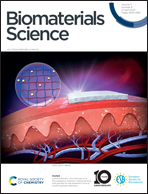A potential platform of combining sialic acid derivative-modified paclitaxel cationic liposomes with antibody–drug conjugates inspires robust tumor-specific immunological memory in solid tumors†
Abstract
The recent approvals for antibody–drug conjugates (ADCs) in multiple malignancies in the past few years have fueled the ongoing development of this class of drug. However, the limitation of ADCs is selectivity toward cancer cells especially overexpressing the antigen of interest. To broaden the anti-cancer spectrum of ADCs, combinatorial strategies of ADCs with chemotherapy have become a central focus of the current preclinical and clinical research. Here, we used the microtubule stabilizer paclitaxel and enfortumab vedotin-ejfv (EV), an ADC carrying the microtubule inhibitor payload monomethyl auristatin E (MMAE), for co-administration under the consideration of their mechanism of action associated with microtubules. We designed a sialic acid–cholesterol (SA–CH) conjugate-modified cationic liposome platform loaded with PTX (PTX-SAL) for efficiently targeting tumor-associated immune cells. Compared with monotherapy, PTX-SAL-mediated combination therapy with ADCs significantly inhibited S180 tumor growth in mice, with complete tumor regression occurring. The formation of a durable tumor-specific immunological memory response in mice that experienced complete tumor regression was assessed by secondary tumor cell rechallenge, and the production of memory T cells in the spleen was detected as related to the increased CD4+T memory cells and the enhanced serum IFN-γ. All our preliminary results throw light on the tremendous application potential for the application of this combination therapy regimen capable of mounting a durable immune response and stimulating a robust T cell-mediated tumor-specific immunological memory.



 Please wait while we load your content...
Please wait while we load your content...